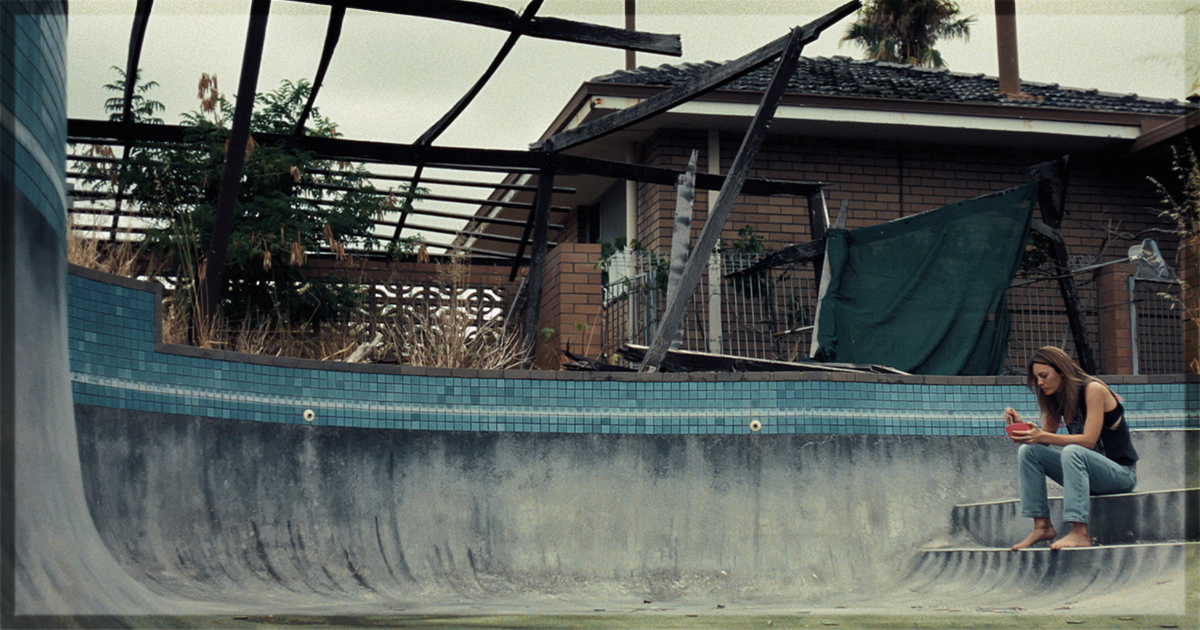The performances in He Ain’t Heavy are so emotional that it takes a while to notice the movie is essentially a three-hander, between Jade (Leila George), her little brother Max (Sam Corlett), and their mother Bev (Greta Scacchi, Ms. George’s real-life mother). They live in Perth in western Australia and love each other utterly, though over the course of the film it becomes clear the triangle is not equally balanced. For Max is a drug addict, so lost to normal society he has jailhouse face tats and is perfectly willing to assault his mother if it gets him more money for drugs. But that doesn’t change how Jade feels about him, not at all. He is her little brother and her sense of responsibility for him is what drives this barnstorming film.
Bev’s last parent has recently died and Jade is helping Bev prepare the empty house outside town, where the kids spent a lot of time as children, for sale. Jade slowly realizes that one of the bedrooms has bars on the windows despite being inside a glassed-in porch, and she has an idea. She makes preparations and then finds Max at a disgusting squat where she offers $100 in exchange for his help moving furniture.
Of course Max gets in the car and of course he helps himself to her drink in the cupholder. But the drink is drugged, the bedroom door has secretly been reinforced and when Max wakes up he discovers Jade has locked him in. The intention is to force him to detox, so that once he is actually drug-free after a week his underlying problems – which are implied, but it’s clear Jade doesn’t directly know why he’s so seriously mentally unwell – can finally be addressed. Of course Max is furious, and quite terrifying, but for once her in life Jade is resolute. And when Bev finds out what Jade has done things get even more out of hand.
Writer-director David Vincent Smith has made it clear in press interviews and at the talk at the Melbourne International Film Festival that the movie is inspired by his own family’s experiences of addiction, and the feel of exhausted authenticity is what keeps the drama from tipping over into melodrama. Jade loves her brother so much she’d go through rehab on his behalf, if it would make any difference. Her best friend Tegan (Alexandra Nell), who knows the score, is moving overseas for work but still desperately trying to get Jade to put herself first. And Jade isn’t stupid: she’s still doing episodic bar work age thirty while watching her friends settle down, expand their careers and have kids, but managing the mayhem and mitigating the harm Max causes is her full-time job. It’s not, Tegan says. It is, says Jade. Because if I don’t do it, he’ll die.
Mr. Corlett is so good as a man so overwhelmed by his uncontrollable emotions and his dangerously bad choices that the performance runs the risk of harming his career, that people will see his performance as the conniving, threatening, needy addict as a true depiction of himself. Ms. Scacchi also brilliantly walks the fine line of a mother who has decided to love her child unconditionally despite the enormous harm this has caused herself. Bev simply cannot stop seeing her little boy as exactly that, regardless of whether he is stealing her car or holding broken glass to a throat, and this resignation is conveyed almost entirely through body language.
So it’s Ms. George’s character who has the hero’s arc, who must decide if she can accept that her beloved brother is responsible for his own choices and she is responsible for hers. And this is also largely done through the physicality of Ms. George’s performance, as she eats cereal in an empty swimming pool or tries to force herself to smile at a party. Ms. George’s closeness to Mr. Corlett feels organic and lived-in, and you find yourself wishing that Jade was pouring all this love into someone who deserved it. And the great achievement of He Ain’t Heavy is that you completely understand why Jade believes so wholeheartedly that Max does indeed deserve it. These performances couldn’t have been poured into a more deserving film.
Emma Fletcher’s production design does an extraordinary job of making the house feel like it has a complete, decades-long family history, while cinematographer Lewis Potts and editor Antony Webb do an excellent job of maintaining the pace and enlargening the limited space. Brad Habib’s sound design is more muted, largely focusing on the cockatoos that wake up every Australian morning, meaning that when music is used it’s even more powerful. The main hiccups are the mistakes Jade and Bev make in their dealings with Max while he’s locked in, as they extend a level of trust which might be believable in their first year of cleaning up his messes, but clearly everyone here is long past that.
On the other hand, if they were hardened, angry cynics more interested in punishing Max than loving him, there wouldn’t be much of a movie. But Mr. Smith has been smart enough to use his own painful personal experience into service of excellent, knowing art. He Ain’t Heavy is a wonderful movie that finds exactly the right note of love in the midst of all the horror. It also, unusually, has a perfect title.
He Ain’t Heavy recently screened at the Melbourne International Film Festival.
Learn more about He Ain’t Heavy at the Melbourne website for the title.


